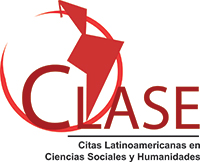FACTORES DEL CLIMA ORGANIZACIONAL QUE INCIDEN EN LA PERMANENCIA DE LOS TRABAJADORES EN UNA EMPRESA DE REPARACIÓN DE AUTOS Y CAMIONES
Abstract
This article presents the findings from a research conducted in order to determine which organizational climate factor or factors influence the retention in the organization to focus organizational efforts on those which appear to be the most important. Structural equation modeling was used, first it was performed a confirmatory factor analysis and then structural modeling regression was made using the computer program Stata. It was found that the major determinant of permanence in the workplace is the autonomy to organize and develop their own work and secondly the perception of aid received from the company.
Downloads
References
Arias Galicia, Fernando. “El compromiso personal hacia la organización y la intención de permanencia: algunos factores para su incremento”. Revista Contaduría y Administración, 200, enero-marzo de 2001.
Bazán, Aldo; Sánchez, Beatriz y Sandra Castañeda . “Utilidad de los modelos estructurales en el estudio de la lectura y la escritura”. Revista Interamericana de Psicología, 40 (1), 2006, pp. 89-97.
Bentler, Peter. EQS Structural Equations Program Manual. Encino: Multivariate Software, 1995.
Bollen, Keneth. Structural Equations with Latent Variables. Nueva York: Wiley, 1989.
Brown, Steven P. y Thomas W. Leigh. “A new look at psychological climate and its relationships to job involvement, effort, and performance”, Journal of applied psychology, 81, 1996, pp. 358-367.
Byrne, Barbara. Structural Equation Modeling with EQS/Windows. Londres: Sage Publications, 1984.
Chiang, Margarita; Núñez, Antonio; Martín, María José y Mauricio Salazar. “Compromiso del trabajador hacia su organización y la relación con el clima organizacional: un análisis de género y edad”. Panorama Socioeconómico, 28 (40), julio de 2010, pp. 92-103.
Chiang, Margarita; Núñez, Antonio; Martín, María José y Mauricio Salazar. “Clima y satisfacción laboral en instituciones públicas: adaptación y ampliación de un instrumento”, en Ayala Calvo, J.C. y grupo de investigación FEDRA (eds.). Conocimiento, innovación y emprendedores: Camino al futuro. Logroño: Universidad de la Rioja,
Chiang, Margarita; Núñez, Antonio; Martín, María José y Mauricio Salazar. “Clima organizacional y satisfacción laboral en un establecimiento de salud estatal: hospital tipo I”. Theoria. 16 (2), 2007, pp 61-76.
Eisenberg Robert; Hungtington, Robin; Hutchinson, Steven & Deborah Sowa. “Perceived Organizational Support”, Journal of Applied Psychology, 71, 1986, pp. 500-507.
Koys, Daniel y T. A. Decosttis. “Inductive Measures of Psychological Climate”. Human Relations, 44, (3), 1991, pp. 265-385.
Likert, Rensis. New patterns of management. Nueva York: McGraw Hill,
Méndez Valencia, Sergio; Hérnandez Sampieri, Sergio y Benito Erasmo Vargas Álvarez. “La relación entre el clima laboral y la cultura organizacional en el contexto del modelo de valores en competencia”. Ciencias administrativas: teoría y praxis, julio–diciembre de 2013.
Raykov, Tenko y George Marcoulides. A first course in structural equation modeling. Nueva Jersey: Laurence Erlbaum Associates, 2000.
Schneider, Benjamin. “Organizational climates: an essay”. Personnel Psychology, 28, pp. 447-479.
Schneider, Benjamin y Aaron Reichers. “On the etiology of climates”. Personnel Psychology, 36, 1983, pp. 19-39.
Silva, Manuel. El clima en las organizaciones: teoría, método e intervención. Barcelona: PPU, 1992.
Schumacker, Randall y Richard Lomax. A beginner’s guide to structural equation modeling. Nueva Jersey: Lawrence Erlbaum, .Taormina, Robert. “The Organizational Socialization Inventory”, International
Journal of Selection and Assessment, 2, 1994, pp. 133-145.
Tolman, Edward. Purposive behavior in animal and men. Nueva York: Century, 1932.
Vigotsky, Lev S. Obras escogidas. Tomo 1. Moscú: Pedagogía, 1982.
Copyright (c) 2016 Denarius

This work is licensed under a Creative Commons Attribution-NonCommercial-ShareAlike 4.0 International License.














